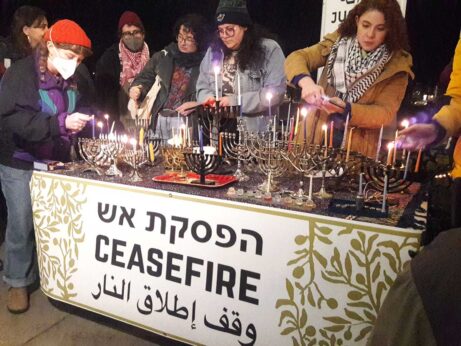
CHICAGO⎯ “We are here to call for a lasting ceasefire in Gaza because it is grounded in the belief that every single life is sacred. The movement for a ceasefire is on the side of life. Military action has never brought us peace and clearly never will,” said Eli Newell.
Newell spoke on the first night of Hanukkah on Dec. 7 and the ritual lighting of the first candle on the menorah. Over 100 people were at the Welles Park event, many bringing menorahs that covered a table.

The observance, called Ceasefire Hanukkah, was hosted by IfNotNow, a group of American Jews demanding an end to U.S. support of the Israeli apartheid-like system of oppression of Palestinians and for a peaceful, just, and collective future for both peoples. Similar Hanukkah gatherings calling for a ceasefire in Gaza took place across the U.S., including a larger one hosted by Jewish Voices for Peace and Tzedek Chicago in Federal Plaza.
The Hanukkah tradition is over 2,000 years old. Hanukkah commemorates the revolt of the Maccabees in 167-164 BCE (Before the Common Era, as Jews prefer to say) against the Greek occupation of Jerusalem and Palestine. According to history, the first Hanukkah candles were lit during rebuilding after the devastation of colonial subjugation and represent hope for the future.
“We are here because we care about human life,” said Newell. “All life is sacred. Since Oct. 7 we have had to grieve the loss of so, so much human life. We grieve that so many have forgotten a human life is sacred.”
“We are gathering around these flames that represent hope and resilience and overcoming impossible odds to build a better future for all,” he said.
The gathering reflected a collective sense of grief, despair, and fury over the incomprehensive loss of life during the horrific massacre of 1,200 Israelis by Hamas and the response by the extreme-rightwing Netanyahu government, resulting in the killing of 17,000 Palestinians in Gaza and the West Bank, massive destruction, and a humanitarian catastrophe.
The Hanukkah observance acknowledged the tragic loss of life of both peoples, including of family and friends in Palestine and Israel, and the infuriating reality that U.S. elected officials are doing nothing to stop it. The U.S. government is the largest supplier of military hardware to Israel.
“We too are lighting Hanukkah candles as a sign we will not lose our drive towards a just future, that our care for the sacredness of every human life will not be dimmed,” said Newell. “We gather to call for a ceasefire because every life is part of the eternal flame. We refuse the choice of ‘us’ and ‘them.’”
During the observance, participants sang the traditional song “Alish Tamid, My People” in a round with “Which side are you on?”
“When we sing the song now, we are saying we are on the side of humanity. We are on the side of fighting for safety and justice for all. And we want our whole community to join us. We’re not going to leave anyone behind,” said Newell.
“We welcome all allies. If you are feeling outrage, grief, despair, and hope all at once we are with you,” said Lizzy, another leader of If Not Now. “And if you are ready to take action you have come to the right place.”
“This year especially it’s important to be visible amid rising anti-Semitism and Islamophobia as Jews who are calling for a ceasefire,” she said. “We continue to publicly display our commitment to a vision of solidarity, interdependence, mutual safety, and collective liberation.”
Among those joining the observance was Melissa from Glenview, Ill. “I’ve been active with IfNotNow and Jewish Voices for Peace since college,” she said. “My father would always write letters to people in Israel who were imprisoned for refusing military service. He would say, I’m an American Jew and your community might not support you, but I do. That spirit has always guided me.”
“The conflict has escalated beyond anything we could have imagined,” said Melissa. “It’s important to find community with others who feel a sense of outrage and despair.”
Seeing the families of hostages taken by Hamas speaking out inspired Melissa, as has the number of Holocaust survivors who have condemned the government assault and declared, ‘We didn’t survive the Holocaust to see this happen again to anyone.’ “It’s been very powerful,” she said.
In a particularly emotional moment, Joy Wong read a poem by Refaat Alareer, a Palestinian literary scholar, poet, and activist who was killed that day along with his family in an Israeli air strike. Many participants openly sobbed during the reading.
If I must die,
you must live
to tell my story
to sell my things
to buy a piece of cloth
and some strings,
(make it white with a long tail)
so that a child, somewhere in Gaza
while looking heaven in the eye
awaiting his dad, who left in a blaze—
and bid no one farewell
not even to his flesh
not even to himself—
sees the kite, my kite you made, flying up
above
and thinks for a moment an angel is there
bringing back love
If I must die
let it bring hope
let it be a tale
The observance ended with the reading of the Kaddish, the traditional mourner’s prayer over the sea of grief from the immense loss of life. “It is in part through our grief that we sanctify life,” said Newell.










